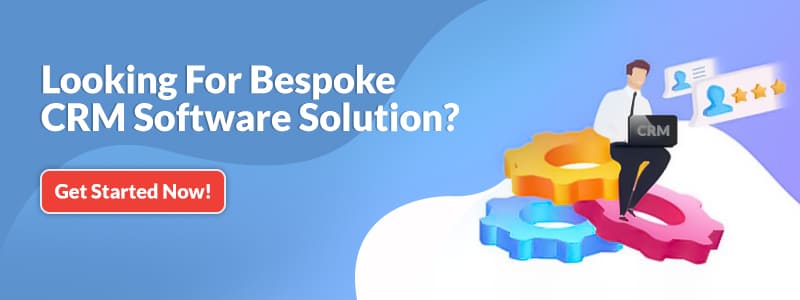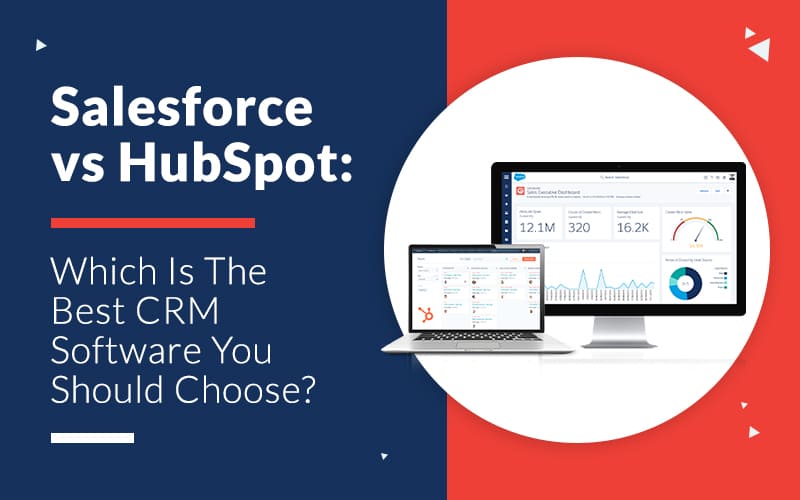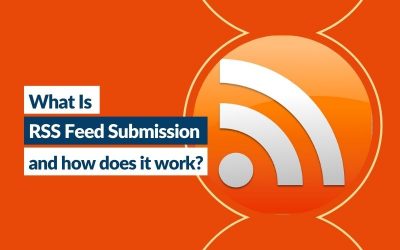Salesforce vs HubSpot: Which is the best CRM software you should choose?
CRM software is a must-have tool for any company, whether it is developed or expanding. CRM software can help you handle your customer information effectively, convert them into targeted users, and maximize your ROI, whether you’re a small company or a large corporation. CRM software can help you handle your customer information effectively, convert them into targeted users, and maximize your ROI, whether you’re a small company or a large corporation.
Many companies choose to use obsolete CRM procedures because they believe that navigating the transfer process is difficult, time-consuming, and costly to manage. As a result, it’s critical to choose the best CRM software that meets your company’s requirements.
But, with so many best CRM applications on the market, how do you know which one to choose? Even so, when it comes to CRMs, two names immediately spring to mind: HubSpot CRM software and Salesforce CRM system.
To put it politely, the rivalry is fierce. As a result, we’re going to give you a comprehensive analysis of HubSpot and Salesforce CRM today. To try to address the all-important question, we’ll compare and contrast all facets of both.
So without taking much of your time, let’s start with the basics first!
What is CRM software?
Customer relationship management is the process of handling the customers’ relationships. Customer relationship management (CRM) is a strategy for managing a business’s interactions with existing and future customers. It provides users with end-to-end analysis.
You can use CRM software to build and establish good relationships with all of your business connections. Custom CRM software assists the company in finding and grouping contacts, tracking important messages, and maintaining customer touchpoints.
Best CRM software combines data from various departments around the organization to provide a centralized and informative view.
It’s no surprise, then, that perhaps the CRM marketplace is probably the most robust software industry, with a CAGR (Compound Annual Growth Rate) of 14.2 percent predicted by Grand View Research from 2020 to 2027.
Moving on, here are some benefits of using CRM software. So take a look!
Benefits of using CRM software
Here are some of the many advantages of introducing CRM software in your business.
- Via the system’s sales dashboards and statistics, you can get a good picture of how the company is doing
- With CRM software, retaining track of customer information is a breeze. All of their online activity is tracked, including the websites they visit, the content they access, and the people they talk to
- It’s simpler for salespeople to spot patterns and forecast and prepare for the future now that all of their sales data is in one location and reports are generated on a daily basis
- Your sales representatives can make outreach simpler and more effective by categorizing and identifying contacts based on relevant criteria.
As we discussed CRM software and the benefits of using it, now let’s move forward and discuss these two popular CRM software, namely HubSpot & Salesforce CRM.
Recommended Read : How CRM and ERP Integration Can Benefit Your Business?
What is Salesforce CRM?
Using cloud solutions, the Salesforce CRM framework helps businesses better connect with clients, partners, and potential customers. The customer service system has risen to prominence on the charts, allowing businesses to track customer activity, sell the product, and provide a variety of many other salesforce services.
As new innovations become available, it introduces business intelligence tools and deep learning-powered analytics. It is one of HubSpot’s closest rivals in terms of content delivered and user engagement, thanks to its lengthy tradition and generalized approach to the business promotional tool.
Apart from these, it provides various other services like:
- Salesforce Marketing Cloud
- Salesforce Commerce Cloud
- Salesforce Sales Cloud
- Salesforce Community Cloud
- Salesforce Service Cloud
- Salesforce Analytics Cloud, etc.
So, now let’s discuss,
Pros and Cons of Salesforce CRM
Pros of Salesforce CRM:
- Since it’s cloud-based Software, it uses fewer resources
- Extensive reporting and analytics are available
- Lead management is easy
- Salesforce’s offerings address a broad range of market requirements
- It is adaptable
- Users can quickly integrate external systems
- Provides a 360-degree view of the consumer
- It facilitates successful teamwork
- Contact management is easy.
- The framework includes functionality that aims to enhance user experience and optimize the user interface.
Recommended Read : Why Your Business Should Use Salesforce Integration Services?
Cons of Salesforce CRM:
- It is essential to collaborate with the right Salesforce implementation partner.
- Good internet access is needed for both entry and service
- It can be not easy to deal with at times
- Expenses are higher because there is a lot of features and goods
- Customization is difficult
- User experience is often disrupted by constant updates
Now let’s move our attention and discuss,
What is HubSpot CRM software?
HubSpot CRM Software is a complete suite of advertising, sales, and customer support software that includes a robust CRM. HubSpot CRM is simple to use and inexpensive. HubSpot’s user-friendly CRM is a perfect option whether you’re unfamiliar with CRM or already use HubSpot’s marketing or sales tools. HubSpot CRM is a tool that can help in the coordination and tracking of visitors into buyers. HubSpot CRM Software was created for companies who want to spend less time tracking data. It compiles all of your contacts into a single, customizable folder.
Moving on, let’s quickly discuss,
Pros and Cons of HubSpot CRM Software
Pros of HubSpot CRM:
- The very same device holds marketing automation, customer support, and sales software
- Integration between HubSpot and Salesforce is easy
- Scalable to any size
- The experiences and activities of customers are automatically recorded
- Provides auto for CTA
- The CRM can be fully customized
- A free WordPress and WooCommerce plugin is also available from HubSpot CRM
- Creating, scheduling, and uploading social media posts is easy
Cons of HubSpot CRM:
- Since it’s still a new and less sophisticated system, big sales teams can run into issues
- There is no automation
- In comparison to Salesforce CRM, it is less stable
- Multiple sales processes could not be compatible with HubSpot’s inflexibility
- Lack of adaptability
- Basic reporting is available
Since we addressed a lot about both the CRM systems, now let’s move forward and discuss the core part of this blog which is,
Salesforce vs HubSpot CRM: which one is the best CRM software you should choose? In-Depth analysis!
The business has different objectives and viewpoints. Their tactics must be in sync with each other. Although all of these systems have their distinct strengths and competitive advantages, it’s best to compare their functionality to see which one perfectly represents your business requirements.
So let’s start!
1. Features and Functionality
HubSpot CRM provides small business solutions, including a free primary CRM option. If you are setting up a small company, it is so clear that HubSpot is the ultimate platform for you.
Salesforce, on the other hand, provides a wide range of features for companies of all sizes. Complex sales procedures, distinct reporting and analysis, and a more personalized dashboard are all possible with the tool. Salesforce is more challenging and time-consuming to master, while HubSpot is explicitly designed for newcomers.
In the context of inbound marketing strategies, HubSpot CRM excels at business intelligence, lead management, and digital marketing. You can monitor your current and future customers using email marketing and social media advertising campaigns with this CRM software.
If you choose to do some things with Salesforce CRM software, you’ll need to incorporate various other salesforce services. Nonetheless, the enhanced analytics and reporting functionality allow you to learn so much about your customer.
2. Market Value
If you ask any salesperson which marketing automation software is the most common, they will undoubtedly say Salesforce. And, given that Salesforce controls roughly 20% of the industry, they’d be correct in their assessment. But that isn’t to say HubSpot isn’t still in the picture. HubSpot has gradually increased its market share. And, despite having just about a 3.4 percent share of the CRM ecosystem, it is unquestionably a CRM platform to be reckoned with.
There’s no doubt that Salesforce CRM software is currently the industry leader. But the HubSpot CRM system, being the new one on the block, is quickly increasing in popularity. It’s possible that one day we’ll discover it as among the most common promotional tools.
3. Analytics Capability
You can’t tend to neglect Monitoring and Reporting functionality in today’s world of data-driven market strategies. Salesforce CRM software is extremely strong in this regard, with robust analytics capabilities that make for a great deal of flexibility. The Salesforce solutions have analytics built-in; for instance, the Einstein Analytics Dashboard keeps track of critical business activities. It also includes highly interactive charts and diagrams, both of which aid data visualization.
HubSpot CRM software has monitoring and reporting capabilities, but they are less and less efficient than those provided by Salesforce. This is primarily due to HubSpot’s restricted storing data abilities.
Salesforce CRM seals the deal whenever it relates to analytics and monitoring abilities based on the current state of affairs. HubSpot CRM, on the other hand, is quickly catching up and could soon overtake the pioneer in this area of best CRM software.
4. Customization
Users of Salesforce CRM can customize work processes despite having to hire a specialist engineer. However, the task may take longer due to the high number of features it provides. HubSpot CRM also provides some personalization but not as much as Salesforce CRM software. When you upgrade to a premium HubSpot plan, you get more configuration options.
That being said, HubSpot CRM has finally introduced the choice for custom items, which further improves its customization. Even if the consumer only has the rudimentary technical expertise, they may customize pipelines, deal levels, and views to meet their specific requirements.
Here, it’s more a question of necessity than functionality accessibility. HubSpot is the wisest option if you’re hoping for a fast, convenient, and easy solution that can be personalised to suit your business operations. Salesforce, on the other side, is the one to go with if you want a lot of customization options and a lot of business versatility.
5. Usability
The training materials available for a product play a significant role in how convenient it is to use. In the next part, we’ll go over that. However, in addition to offering training resources, HubSpot CRM software is simple to learn and use for those with limited technical expertise. HubSpot CRM software has created an elegant and straightforward platform as a result of their ability to serve companies of all sizes and the vast amount of input they could get from free programs of their software.
Salesforce CRM system is unquestionably a robust tool, but it also arrives with a big learning curve. If your company requires more dynamic content than those provided by HubSpot CRM software, and you have somebody on staff that is keen to learn the app’s pros and outs, the Salesforce CRM system may be the perfect fit for you.
Conclusion
That’s all we have to say about the HubSpot vs Salesforce question from our perspective. While both are excellent options, we believe the final decision will be based on your company requirements and the level of functionality required.
Both Salesforce CRM and HubSpot CRM software are excellent solutions for any company or CRM requirements you might have. However, when you combine both of these, they work a lot better and become even more effective. We recognize that this is a more expensive choice in the long run, but by combining these two applications and having them work together with your company, you can gain a significant competitive advantage.
We assume you now have a stronger insight of both the product and our services. Please contact us if you need assistance with HubSpot and Salesforce integration or custom CRM application development. Matellio experts would be delighted to assist you.
Thanks for reading.




